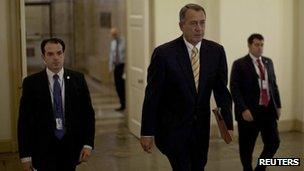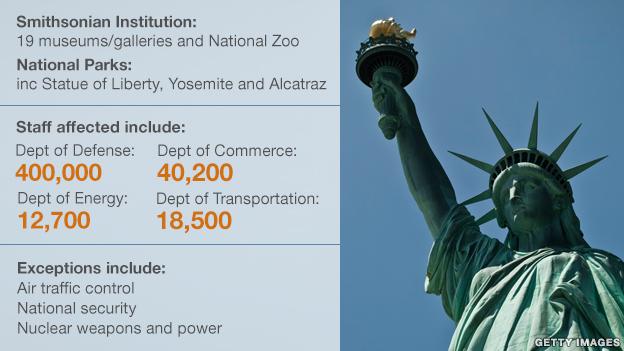Obama invites Republicans to talks as debt ceiling looms
- Published

House Speaker Boehner said he and other Republicans would meet Mr Obama on Thursday
President Barack Obama has invited Republican congressmen for talks over the ongoing government shutdown and the looming borrowing limit.
The move comes nine days after the US government partially closed when Congress could not agree a budget.
Mr Obama has demanded Republicans raise the borrowing limit and reopen the government before he will negotiate future fiscal policy.
The US risks default if the borrowing limit is not raised by 17 October.
On Wednesday, a spokesman for Republican House Speaker John Boehner said he and several other senior Republicans in the House of Representatives would meet Mr Obama on Thursday.
Mr Obama has said he is willing to hold talks with the Republicans on "every item in the budget".
But he says he will not negotiate until Republicans agree to lift the dual threats of the government shutdown and the fiscal calamity looming if the US breaches the limit at which it is allowed to borrow money to fund its budget and debt obligations.
Democrats back Obama
US shutdown felt in Washington as debt limit deadline looms
On Tuesday, he said the Republicans were practicing "extortion" by demanding significant policy concessions, especially changes to his signature healthcare programme, in exchange for reopening the government and approving a rise in the debt ceiling.
Leaders in the Republican Party, meanwhile, have attacked the president for refusing to negotiate.
Following a meeting with Mr Obama on Wednesday, House Democrats, a minority in the chamber, reaffirmed their support for the president's demand that Republicans end the shutdown and raise the debt ceiling before negotiations take place.
"We can talk while the government is open," Steny Hoyer told reporters. "The government doesn't need to be shut for us to talk, and we can talk while we make sure that the government pays its bills."
Meanwhile House Republicans are reportedly considering a short-term increase in the debt limit as a means of breaking the political deadlock.
Unnamed Republican officials told the Associated Press news agency on Wednesday the Party was exploring legislation to raise the debt ceiling for an undetermined length of time. No further details of the reported legislation were offered.
Default doubt
As the ninth day of the partial government shutdown wore on, Democratic senators took to the US Capitol's steps to call on Republicans to reopen the government.
The Senate's Democratic leaders have introduced legislation that would allow the US to borrow money through the end of 2014.
But its path forward in the Senate is unclear, as the bill would have to attract several Republican votes to clear a procedural test vote, expected on Saturday.
Complicating the political situation, a growing number of Republicans have questioned the extent of the economic damage if the US does breach the 17 October deadline without raising the borrowing limit.
"I would dispel the rumour that is going around that you hear on every newscast that if we don't raise the debt ceiling we will default on our debt," Oklahoma Republican Senator Tom Coburn told CBS on Monday. "We won't."
Treasury Secretary Jack Lew has said that on 17 October the US will have exhausted its borrowing limit and will have only $30bn (£19bn) cash on hand to fund a government that can spend as much as $60bn on certain days.
'Outraged and embarrassed'
The IMF has warned a failure by Congress to raise the federal debt ceiling and US default would cause "a worldwide shock" to the economy.
Also on Wednesday, the House, in a near-unanimous vote, external passed legislation to restore death benefits to families of fallen US soldiers.
The defence department typically pays $100,000, tax-free, within three days of a soldier's death, but the shutdown left it no authority to pay.
White House spokesman Jay Carney told reporters that Mr Obama was "disturbed'' to learn a previous bill ensuring military members were paid during the shutdown did not cover the benefit, but that the administration hoped to find a resolution to the problem.
Shortly after the House vote, Defence Secretary Chuck Hagel announced the Pentagon had struck a deal with the Fisher House Foundation, a private charity, to fund the benefits until the shutdown ends.
"I am offended, outraged, and embarrassed that the government shutdown had prevented the Department of Defense from fulfilling this most sacred responsibility in a timely manner," Mr Hagel said.
